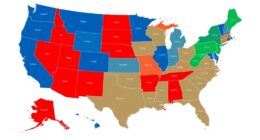To find Missouri arrest warrants, individuals can utilize resources like Casenet, contact local law enforcement or county courthouse clerks, and search using litigant names or case numbers. Different warrant types exist, including Alias, Bench, Capias, Civil Capias, and Fugitive warrants, each serving specific purposes. Bench warrants relate to court appearance failures, while Capias warrants result from non-compliance with court orders. It's important to address warrants promptly to avoid legal consequences, and persistent checking through official channels is advisable. Understanding these warrant types ensures individuals can navigate legal matters effectively. Additional details on search methods and warrant types can provide in-depth insights into handling potential legal issues.
Key Takeaways
- Utilize online database Casenet for warrant searches.
- Contact local law enforcement or county courthouse for assistance.
- Search using litigant name to find active warrants.
- Different types of warrants include Alias, Bench, Capias, Civil Capias, and Fugitive.
- Act promptly to address warrants and avoid legal consequences.
Missouri Warrant Search Methods
To search for Missouri arrest warrants, individuals can utilize online databases such as Casenet or contact local law enforcement for assistance. Casenet offers a convenient platform for searching for active warrants by using the litigant name search feature.
Alternatively, reaching out to local law enforcement or the county courthouse clerk can also provide information on any existing arrest warrants. In Missouri, various types of arrest warrants exist, including Alias, Bench, Capias, Civil Capias, and Fugitive warrants.
Among these, resolving a bench warrant is particularly important to avoid potential consequences like arrest and additional fines. Understanding the different types of arrest warrants and the available methods for searching for them can help individuals stay informed and take necessary steps to address any outstanding legal issues promptly.
Accessing Missouri Case.net

Access Missouri Case.net to access public case records and information on court proceedings in the state of Missouri. This online platform allows users to search for court case information using various criteria such as litigant name, filing date, or case number.
Individuals can find details about scheduled hearings, trials, judgments, and charges for cases falling under the Missouri Revised Statutes. Additionally, Missouri Case.net offers a convenient Pay By Web feature for online payments related to court cases, streamlining the process for users.
Regular system announcements keep users informed about updates, new features, and improvements to enhance their experience. By accessing Missouri Case.net, individuals can easily stay up-to-date on their court cases and access important public records necessary for legal proceedings and staying informed about their cases.
Types of Arrest Warrants

Different types of arrest warrants are issued by authorities for various legal reasons, including failure to appear in court and non-compliance with court orders.
In Missouri, individuals may come across Alias warrants, which are issued when someone fails to appear before a plea or citation response, resulting in additional charges.
Bench warrants are another common type, issued when a person fails to appear on a scheduled court date. These warrants can impact both the individual's criminal background and their DMV records.
Capias warrants are utilized for individuals who fail to comply with court orders, potentially leading to legal repercussions.
Fugitive warrants are issued for suspects who flee to another state, necessitating extradition back for prosecution.
Additionally, Civil capias warrants are issued for non-criminal matters, such as failing to comply with civil court orders.
Understanding the different types of warrants in Missouri is essential for individuals to navigate legal proceedings effectively.
Understanding Bench Warrants

Bench warrants are issued by authorities when an individual fails to appear in court on a scheduled date. In Missouri, failure to appear can result in the issuance of a bench warrant. These warrants can lead to additional charges, fines, and have implications on one's criminal and DMV records.
Resolving a bench warrant involves contacting the specific judge who issued it to address the situation promptly. Ignoring a bench warrant isn't advisable, as it can eventually lead to arrest, whether at home, work, or during routine traffic stops.
Seeking legal advice from criminal defense attorneys is vital when dealing with bench warrants to navigate the legal process effectively and avoid further complications. It's essential to address bench warrants swiftly to minimize the potential consequences they can have on one's legal standing and overall well-being.
Checking for Capias Warrants

Individuals in Missouri can check for capias warrants by accessing public records or contacting the relevant court or law enforcement agency. Capias warrants are issued when individuals fail to comply with court orders, such as paying fines, attending court hearings, or following judgments. These warrants can result in arrest and additional penalties until the individual addresses the underlying issue in court. Resolving a capias warrant typically involves appearing before a judge to address the non-compliance. To efficiently check for capias warrants in Missouri, individuals can utilize public records or reach out to the appropriate court or law enforcement agency for information. Ensuring compliance with court orders is essential to avoid the consequences of capias warrants. Below is a table highlighting key points related to capias warrants:
| Key Points | Description |
|---|---|
| Court Orders | Failure to comply leads to capias warrants |
| Arrest Potential | Capias warrants can result in arrest |
| Resolving | Requires appearing before a judge |
| Checking | Access public records or contact authorities |
Exploring Fugitive Warrants

To address individuals who've fled the state to evade arrest or prosecution, exploring fugitive warrants in Missouri is essential. Fugitive warrants are issued for suspects who've left the jurisdiction of Missouri, typically when they're believed to be outside the state. Law enforcement agencies cooperate across state lines to locate and apprehend these individuals.
When suspects with fugitive warrants are found in another state, extradition proceedings may be initiated to bring them back to Missouri for legal proceedings. In addition to the original charges they were facing, suspects with fugitive warrants may also encounter additional penalties for fleeing the jurisdiction.
These warrants play a vital role in ensuring that individuals who attempt to evade the legal consequences of their actions are brought to justice and face the appropriate legal measures in accordance with the law.
Search Warrants in Missouri

Search warrants in Missouri are legal documents that authorize law enforcement to search specific locations for evidence related to a crime. These warrants require a judge's approval based on a showing of probable cause in an affidavit submitted by officers.
Understanding the types of search warrants and how to access warrant information can be vital for individuals involved in legal matters in Missouri.
Types of Search Warrants
Different categories of search warrants are issued in Missouri for specific law enforcement purposes. These Missouri court orders grant law enforcement officials the authority to conduct searches and seizures under certain circumstances. Here are four common types of search warrants in Missouri:
- Criminal Arrest Warrant: Issued when there's probable cause that an individual has committed a crime and authorizes their arrest.
- Civil Capias Warrant: Used to detain an individual until a court appearance or to enforce a judgment.
- Active Arrest Warrant: A warrant that's currently in effect, allowing law enforcement to arrest the individual named in the warrant.
- Missouri Search Warrants: Detail the locations and items to be searched and seized, ensuring the search is conducted within the boundaries set by the warrant.
These various types of search warrants play an essential role in upholding the law while protecting the rights of individuals in Missouri.
Accessing Warrant Information
Accessing warrant information in Missouri can be achieved through designated custodians and state public records websites. Search warrants in Missouri are court orders issued based on probable cause, allowing law enforcement to search and seize property. These warrants must adhere to the requirements outlined in RSMo Section 542.276 to make sure they're valid and protect against unreasonable searches, in line with the Fourth Amendment.
It's important that search warrants in Missouri are executed promptly, as they expire 10 days after issuance if not acted upon by law enforcement. Individuals seeking information regarding search warrants can access relevant details through designated custodians or by utilizing state public records websites.
This access to information helps maintain transparency and accountability in the legal process, ensuring that individuals are informed about any search warrants related to their property or persons.
Find Out if You Have a Warrant

To find out if you have a warrant in Missouri, individuals can start by checking online databases like Casenet using the litigant name search feature.
Another option is to contact local authorities such as sheriff's departments or county courthouse clerks for assistance.
Utilizing these resources can help individuals determine if there are any active arrest warrants against them.
Check Online Databases
Start your search for active arrest warrants in Missouri by utilizing online databases like Casenet. These databases provide access to public information, including warrant details. Here's how to check online databases for Missouri arrest warrants:
- Visit the Casenet website and use the litigant name search feature.
- Enter the last name of the individual you're searching for to uncover any active warrants.
- Review the docket entries associated with the individual to verify the presence of warrants.
If you prefer a more direct approach, contact the local sheriff's department or county courthouse clerk to inquire about any active arrest warrants. Remember, it's important to validate warrant information through official channels to confirm accuracy.
Contact Local Authorities
Begin by reaching out to your local sheriff's department or county courthouse clerk to determine if there are any active arrest warrants against you in Missouri.
When contacting these authorities, be prepared to provide your personal information, such as your full name and any other identifying details, for a thorough warrant search. Local officials will check their database to see if there's an outstanding warrant issued for your arrest.
It's important to cooperate with the process and be ready to verify your identity to ascertain whether there's a warrant against you. Addressing any warrant issues promptly is vital to prevent potential legal consequences and to resolve the matter efficiently.
Duration of Warrants in Missouri

Many warrants issued in Missouri lack an expiration date, remaining active until resolved. This means that individuals with outstanding warrants in the state should address them promptly to avoid potential legal consequences.
Here are some key points related to the duration of warrants in Missouri:
- Arrest Warrants: Most warrants in Missouri don't automatically expire and can be active indefinitely, leading to potential arrests if not addressed.
- Search Warrants: Search warrants in Missouri typically expire 10 days after issuance if law enforcement doesn't execute them within that timeframe.
- Alias Warrants: These warrants are often issued when individuals fail to appear in court, potentially resulting in new charges being filed against them.
- Bench Warrants: Issued for court date absences, bench warrants in Missouri can impact both criminal records and Department of Motor Vehicles (DMV) records, highlighting the importance of resolving them promptly.
Utilizing Online Resources

Accessing online resources like Casenet can be instrumental in searching for active arrest warrants in Missouri. By conducting a Missouri warrant search on Casenet, individuals can input a litigant's name to find information on arrest warrants.
Checking the docket entries on Casenet can also reveal the existence of any active arrest warrants.
As an alternative to online searches, individuals can contact the local sheriff's department or the county courthouse clerk for assistance in obtaining warrant information.
It's advisable to stay proactive in monitoring for arrest warrants online to promptly address any potential legal issues that may arise. Utilizing these online resources can help individuals take the necessary steps to address any outstanding warrants against them, ensuring they stay informed and proactive in managing legal matters that may impact their freedom and overall well-being.
Frequently Asked Questions
Can You Look up Warrants in Missouri?
It is crucial to promptly address any active warrants in Missouri by using online resources like Casenet or contacting local law enforcement. This will help you avoid legal repercussions such as arrest or fines.
Can You Just Pay a Warrant in Missouri?
In Missouri, one cannot simply pay off an arrest warrant like a fine. Warrants require legal resolution through court proceedings. It's essential to address the underlying issues in court to resolve an arrest warrant properly.
How Do I Find Out if I Have a Warrant in Greene County, Missouri?
To find out if there's a warrant in Greene County, Missouri, individuals can check with the Greene County Sheriff's Office website, contact them directly, or use online resources like the Missouri casenet system for warrant information.
Do I Have a Warrant in Illinois?
To find out if there is an active warrant in Illinois, one can check the Illinois Circuit Court website or contact the local Sheriff's Office or Police Department. Failure to address warrants promptly can lead to legal consequences.
Are the Methods for Finding Arrest Warrants in Missouri Similar to Those in Pennsylvania?
When it comes to finding arrest warrants, the methods in Missouri may differ from those in Pennsylvania. However, the process of how to find warrants in PA usually involves checking online databases, contacting the local police department, or visiting the courthouse. It’s important to familiarize yourself with the specific procedures for each state.
Conclusion
In summary, conducting a Missouri warrant search is an important step in staying informed about legal issues. By utilizing online resources like Missouri Case.net, individuals can easily check for different types of arrest warrants, including bench warrants, capias warrants, and search warrants.
Remember to stay proactive in finding out if you have a warrant, and be aware of the duration of warrants in Missouri. Stay informed and take the necessary steps to address any legal matters promptly.









